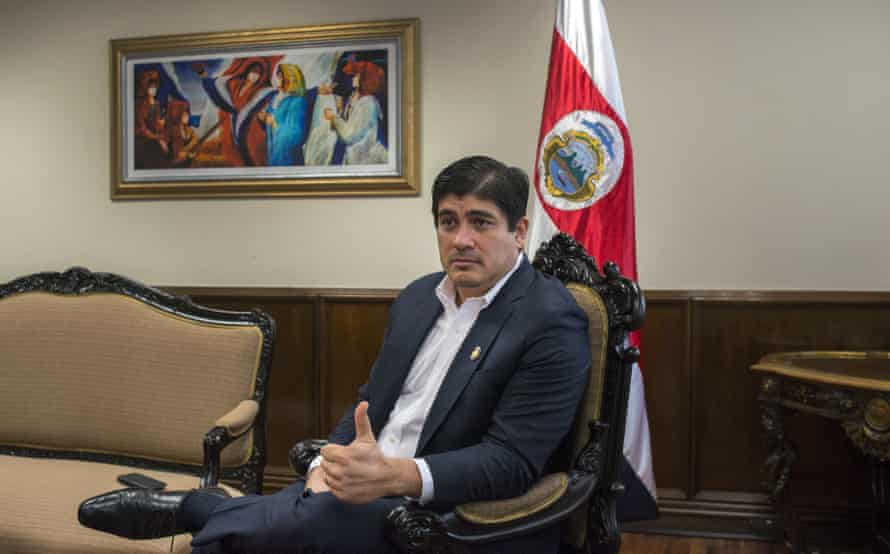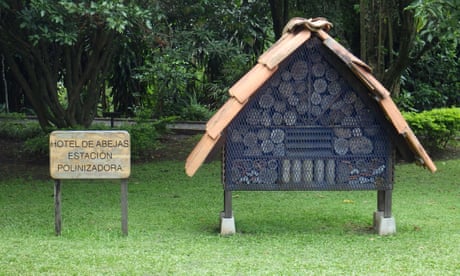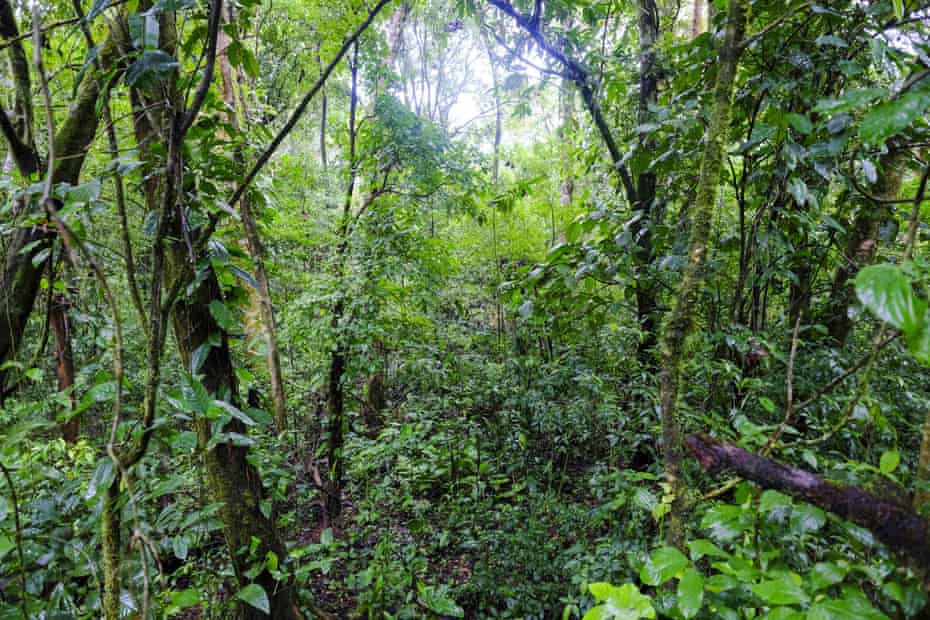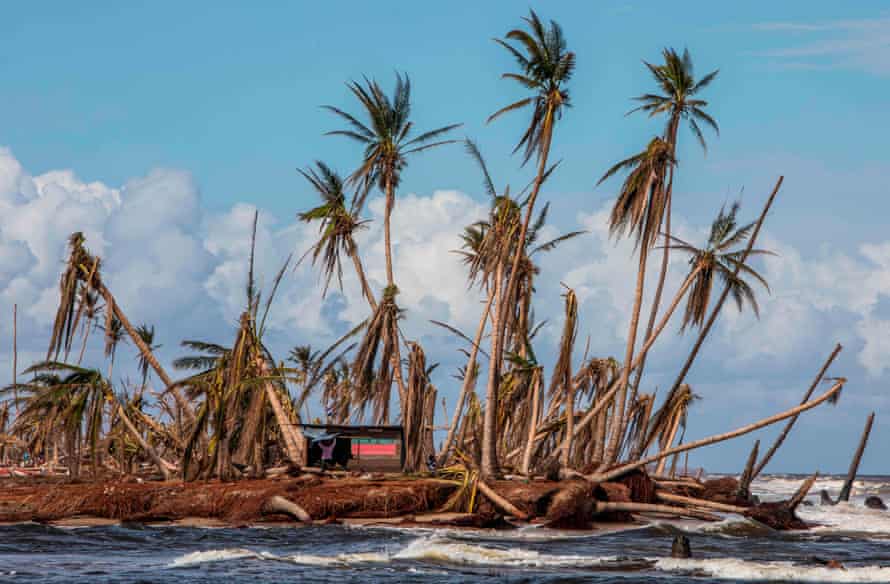The road to KunmingCosta Rica
Interview
‘It's in our DNA’: tiny Costa Rica wants the world to take giant climate step
Patrick Greenfield
President says the time is finally right for international agreement to tackle biodiversity loss and global heating
 Costa Rica’s president, Carlos Alvarado Quesada: ‘Our approach is to lead by example.’ Photograph: Marco Valle/Bloomberg /Getty Images
Costa Rica’s president, Carlos Alvarado Quesada: ‘Our approach is to lead by example.’ Photograph: Marco Valle/Bloomberg /Getty ImagesThe age of extinction is supported by
 About this content
About this content@pgreenfielduk
Mon 22 Feb 2021 22.30 AEDT
958
When it comes to the environment, few countries rival Costa Rica in terms of action and ambition.
The tiny Central American nation is aiming for total decarbonisation by 2050, not just a “net zero” target. It has regrown large areas of tropical rainforest after suffering some of the highest rates of deforestation in the world in the 1970s and 1980s. Costa Ricans play a major role in international environmental politics, most notably Christiana Figueres, who helped to corral world leaders into agreeing the Paris accord.
Now Costa Rica has turned its attention to securing an ambitious international agreement on halting biodiversity loss. In January, more than 50 countries committed to the protection of 30% of the planet’s land and oceans as part of the High Ambition Coalition (HAC) for Nature and People, spearheaded by Costa Rica, which is a co-chair alongside France and the UK.
The coalition hopes the target will become the headline aim for an international agreement on halting biodiversity loss for this decade, set to be negotiated in Kunming, China, later this year.
As Mandela said, 'It always seems impossible until it’s done'Carlos Alvarado Quesada
“Our approach is to lead by example. As Mandela said, ‘It always seems impossible until it’s done’,” the Costa Rican president, Carlos Alvarado Quesada, told the Guardian. “Conservation is one of the key factors that scientists point out as relevant for protecting biodiversity and also for addressing the climate crisis. But working alone, it’s not as effective.”
The world has never met a single target to stem the destruction of wildlife and life-sustaining ecosystems. But the 41-year-old leader believes this time might be different.
Q&A
What is the road to Kunming series?Show

'Sweet City': the Costa Rica suburb that gave citizenship to bees, plants and trees
Read more
Alvarado swept to power in April 2018, defeating a conservative evangelical pastor who had campaigned against same-sex marriage. It was a rare victory for a centre-left candidate in a time of rising global rightwing populism and led Nobel economist Joseph Stiglitz to conclude that Costa Rica was a beacon of enlightenment for its commitment to reason, rational discourse, science and freedom.
Advertisement
But the pandemic and resulting blow to Costa Rica’s ecotourism industry forced Alvarado to enter painful negotiations with the International Monetary Fund, raising fears of large cuts in a country that puts human development at its core, alongside environmentalism.
Costa Rica, now an OECD member, has no standing army, invests heavily in education and boasts a universal healthcare system. The prospect of internationally enforced austerity caused rioting in October last year, and Alvarado pulled out of talks. In January, the IMF and the Costa Rican government agreed a $1.75bn (£1.25bn) package that avoided some of the more controversial proposals.
 Environmental policies are ‘the dominant DNA’ of Costa Rica, says Alvarado. Photograph: Jeffrey Arguedas/EPA
Environmental policies are ‘the dominant DNA’ of Costa Rica, says Alvarado. Photograph: Jeffrey Arguedas/EPADespite the difficult choices, the president said he was encouraged that global action on the environment will result from the pandemic, especially after the election of Joe Biden as US president, with whom he spoke recently.
“It was a very close conversation. We have lots of things in common. We talked about working together in addressing the climate crisis,” Alvarado said. “I think the message of appointing Senator [John] Kerry as ambassador in this area is very strong. It’s going to be a key priority.”
More and more, the real impacts of the climate crisis on our societies is evidentCarlos Alvarado Quesada
Alvarado did not speak to Donald Trump during the latter’s presidency. But the Costa Rican president said the climate crisis and the breakdown of nature were already causing significant problems in the region, including the migrant caravans heading to the US border that often dominate the concerns of US Republicans.
Advertisement
“More and more, the real impacts of the climate crisis on our societies is evident. Just in this past year, Central America was hit by two consecutive hurricanes: Hurricane Iota and Hurricane Eta. Particularly in Nicaragua and Honduras, not only in terms of deaths but also in terms of production and the potential in terms of unemployment, the migrations that it could produce mean you cannot only see the storms in isolation as hurricanes,” he said.
“Scientists say that hurricanes in the region have become more frequent and stronger. This is going to have effects in our societies in terms of economic growth, of jobs, of inequality, of inequality in terms of women, on migration.”
 Devastation caused by Hurricane Iota in Haulover, Nicaragua, in November 2020. Photograph: Inti Ocón/AFP/Getty Images
Devastation caused by Hurricane Iota in Haulover, Nicaragua, in November 2020. Photograph: Inti Ocón/AFP/Getty ImagesAlongside larger partners, Costa Rica will continue to encourage other governments to take bold action on biodiversity at Kunming through the HAC for Nature and People. But the road ahead is not easy. The negotiations cover conservation and the sustainable use of nature – a topic that will involve difficult choices about agriculture, chemical use and resource extraction by far more influential powers.
Advertisement
Alvarado acknowledges these challenges but says that although such issues also exist in Costa Rica, he will continue to focus on being an example.
“Environmental policies do not necessarily have unanimous consensus. For the past decades, they have been the dominant DNA of Costa Rica but there are also some people saying that perhaps we should be exploiting more. But still, I believe that’s very far away from our DNA.”
Find more Age of extinction coverage here, and follow biodiversity reporters Phoebe Weston and Patrick Greenfield on Twitter for all the latest news and features
• This article was amended on 25 February 2021 to correct the surname of President Alvarado.
